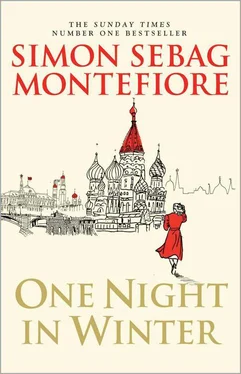‘I won’t, I won’t! Whatever you do to me, I won’t! I know I mustn’t!’ After all he’d been through, he feared the confession could be used against his father and mother.
‘God’s breath. Everyone must sign it.’
‘Everyone?’ Senka looked up at Likhachev. Who else was here? Was Minka nearby? ‘Is my sister signing it?’
Likhachev twitched again, stretched in his chair and then bent his own fingers back so they clicked. ‘All right, come with me.’ He shoved Senka out of the room, down the corridor, opened another door and pushed him inside a room with a glass wall covered by a blind.
‘Senka!’ It was Minka, still in her smart red dress, looking thinner but very much herself.
‘Minka!’ They ran towards each other, hugged and kissed through their tears.
‘What a sweet pair,’ said Likhachev to Colonel Komarov, who was in the room with Minka.
Minka kept her arm around Senka’s narrow shoulders.
‘Have you signed anything?’she asked him.
‘No,’ he said, wiping his eyes with his suit’s sleeves. ‘I didn’t think I should.’
‘I haven’t either,’ said Minka.
‘But, Minka, you were a member of the Fatal Romantics,’ whispered Senka.
‘Think about Mama and Papa!’ she whispered back.
‘No whispering!’ snarled Likachev. ‘Just sign. Both of you.’
‘We won’t sign,’ said Minka.
Komarov chewed on the stump of his finger and then said to his comrade Likhachev, ‘Shall we make this easier?’
Likhachev nodded and Komarov walked over to the blind and flicked a switch. ‘Who’s this, eh?’
Over the tinny speakers, they heard a woman’s voice with a distinctively light Galician accent, saying, ‘Will they be long, Genrikh? Where are they?’ It was their mother.
‘Stop, Dashka,’ replied their father’s voice. ‘It’s out of our hands. The officials of the Organs are dealing with it according to the rules of Soviet justice. So we wait.’
Komarov flicked the switch again. ‘They’re next door. Do you want to see them or not?’
‘Sign or stay in prison!’ added Likhachev.
Minka and Senka held hands.
‘We won’t sign, will we, Minka?’ said Senka, regaining a little professorial authority.
‘I’m sorry, comrade colonels,’ she said. ‘We’re sure we mustn’t sign.’
‘We’re feeling very brave,’ added Senka stoutly. ‘We won’t do it.’
Komarov glanced at Likhachev, who left the room. Then he unclicked the blind, which flicked up on its roller to reveal a waiting room. Senka and Minka saw their parents sitting awkwardly alongside Irina Titorenka and the Satinovs. No one was saying much.
‘Have the others signed?’ asked Minka. ‘George and Vlad?’
‘Of course. Everyone must confess,’ said Komarov.
‘Then why aren’t they out there?’
‘Everyone must sign. It’s orders from the top!’
‘Look!’ said Senka, shrill and frightened. ‘He’s talking to Mama! He’s telling them we’re never coming out! Should we sign?’
Colonel Likhachev was talking to their parents and their father was rising, looking at the two-way mirror and approaching it. He pointed at them and Komarov clicked the switch on the loudspeaker.
‘Children,’ said Genrikh Dorov. ‘Are you there, Minka? Senka? I can’t see you but the colonel says you can hear me. Sign now, and you come home!’
Likhachev re-entered the room, swaggering a little. ‘There, you heard it!’ he said.
Minka and Senka looked at each other.
‘I saw Mama,’ Senka said. ‘She’s in the next room…’
Minka put her arms around him and she too was crying.
THE SATINOVS HAD arrived first, at 6 a.m. When Tamara saw the room, she staggered and he caught her arm. ‘Oh Hercules, this is the room where I’ve been meeting Mariko.’
‘Patience,’ he said, steadying her. This grim grey room, smelling of stale tobacco and sweat, contained four rows of wooden chairs, their seats smoothed by years of nervous waiting families. It was empty but for them. Satinov reflected on his dinner with Stalin: he had been right. Stalin had wanted to look at him before releasing Mariko. But the children were still not home. Was Mariko already looking at them from behind that big mirror on the wall in front of them? How many hundreds of thousands of people had never got this call and had never seen their children, wives, brothers again?
‘Are they ever coming?’ burst out Tamara. ‘Hercules, they’re never coming!’
‘Hush,’ said Satinov. ‘We must wait. There is nothing further we can do.’
An hour later, Vlad’s mother, Irina Titorenka, arrived, then Andrei’s mother Inessa Kurbskaya – and then the Dorovs. When Satinov saw Dashka, his heart lurched painfully, and he looked away.
Genrikh wore a dark suit and twirled his black fedora round a finger, a sign of his confidence, which declared: The Great Stalin needs me again! Satinov nodded at him. Then Tamriko rose and greeted Dashka, whose long heavy hair was pulled back in a bun. What tangled lives we lead, he thought as he watched the two women he most loved in the world hugging in Lubianka Prison as they waited for the children they so adored.
A lull; an hour passed; terrible thoughts: What if Mariko got out but Senka didn’t, or Vlad did and Andrei didn’t?
Tamriko was beside him, her face so loving, so honest. He sighed and took her delicate hand and squeezed it.
Suddenly the door opened. Every parent started – and Vlad Titorenko came in. Crop-haired, bedraggled school uniform, glazed eyes like a zombie. His mother, a jowly, over-rouged woman in a mauve hat like an upside-down chamberpot and a matching coat, exclaimed: ‘Vlad!’ and dabbed at her tears with a dirty yellow handkerchief.
Vlad cringed and looked around the room, clearly afraid of something. ‘Is Papa here?’ he asked.
But Mrs Titorenka seemed even more flustered by this question. ‘No, no… well… he’s not here. He’s gone away.’
That was how Satinov knew that they had arrested his subordinate, Titorenko. For twenty-five years now he, the Iron Commissar, had thrived in this precarious, clandestine world. His children may be coming home, he thought, but his subordinates were being arrested. Not good for him, but not terminal either.
A Chekist came in and talked to Genrikh, who spoke to the mirror, advising Minka and Senka to sign their papers. A few minutes passed. Even Satinov, who had helped storm the Winter Palace in 1917, who had waited in a hushed bunker for the launch of the Stalingrad offensive, was nervous by now, his heart drumming.
Dashka and Genrikh got to their feet. The doors opened and Senka’s sweet, high-pitched voice could be heard, talking about seeing his mother again.
‘She’s a doctor, I hear,’ said the Chekist as he held open the door.
‘Oh yes, she’s the best doctor in the world,’ cried Senka. ‘She sees all the top people.’
And then there he was. Dashka flew towards her boy and Minka; Genrikh put on his fedora and lingered behind her, his expression seeming to suggest that it was perfectly routine for his children to be arrested and then released.
‘Darling Senka!’ cried Dashka, opening her arms and bending over to greet him.
Senka threw himself into her embrace and kissed her face. For a moment, Satinov could only see the top of Senka’s tousled head as he was enveloped in Dashka’s arms. Then she hugged Minka too, and Genrikh touched Dashka’s arm: ‘Not here. Let’s not forget we’re Bolsheviks,’ he said gruffly.
‘Of course,’ said Dashka. They headed for the door, and then Dashka looked back and nodded at Tamriko. ‘Good luck!’ she mouthed. She glanced at him, and then they were gone.
Читать дальше












